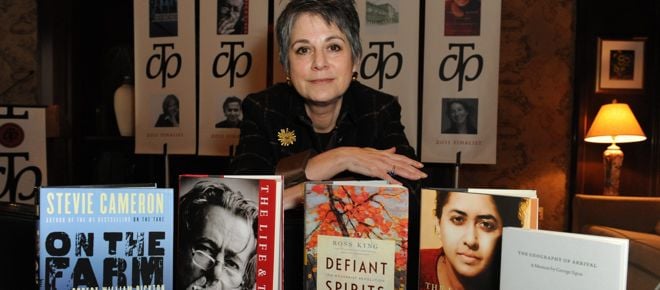Where’s the sizzle in Canada’s non-fiction?
The Charles Taylor Prize always brings out many very good writers. It rarely takes my breath away.
Share

I was at the shortlist announcement for the Charles Taylor Prize for Literary Non-Fiction this morning. Our regular books writer, Brian Bethune, couldn’t make it, so I got to enjoy the fancy cookies and ogle the book types instead. I’ve always been a bit fascinated by the Charles Taylor Prize—and a little bit confused by it, too. Some of the winners have been very good over the years. (Ian Brown’s book, which won in 2010, was great.) But at the same time I’m never quite sure what they mean by “literary.”
Most years, the Taylor longlist is a big mix of biographies, popular works by academics and assorted Title-Colon-Subhead style memoirs (eg: Golden Forest: A Son’s Exploration of the West Coast Woodlands). There’s usually a lot of good work on interesting topics. But rarely does anything jump out as aggressively new. The focus always seems to be more on the subject than the form.
Partly, I think, this is because Canada doesn’t have the magazine culture the U.S. has. There just aren’t the venues here that compete to develop big feature writers that there are in the States. And, to my mind, anyway, that’s where great non-fiction comes from. The two best non-fiction books I read last year, John Jeremiah Sullivan’s Pulphead and The Possessed by Elif Batuman are both collections of, mostly, magazine work. (Sullivan’s in Harper’s, GQ and the Paris Review; Batuman’s in Harper’s, the New Yorker and N+1.)
Competition among the glossies and the literary magazines down south pushes young talent to do new, better work faster. It’s why a new star, like the New Yorker’s David Grann, or Canada’s own Chris Jones at Esquire, seems to pop up every few years. In Canada, even with the Taylor Prize and the lucrative new B.C. national prize, our nonfiction writers just aren’t playing in the same world. They aren’t working from the same kind of tradition, or with the same kind of editors, that produced a John McPhee or a Joan Didion or a David Foster Wallace.
None of this is meant to slight the prize or the books or even the many, many talented Canadian magazine writers out there. People are doing fascinating, wonderful non-fiction in Canada. I think giving them money and national press exposure is an unqualified good thing. But I can’t help wishing, every year when the list comes out, for something with a little more pop, something with a voice or a structure that makes me say: “That’s it. That’s the new thing.” (Obviously, I haven’t read everything out there. I’m no doubt missing a lot of great work.)
All that aside, what struck me about this year’s shortlist was how B.C.-centric it was. It’s tough to argue, after leaving a reception at a Bay Street Bank, that the centre of the Canadian literary world is tilting west. But there’s no doubt that in fiction and non-, B.C. is a power.
Consider today’s short-listed writers:
· JJ Lee, nominated for The Measure of a Man, is a Vancouver Sun columnist and CBC Vancouver commentator.
· Wade Davis, nominated for Into the Silence, is a B.C. native who splits his time between Vancouver and Washington, D.C.
· Charlotte Gill, Eating Dirt, lives on the Sunshine Coast northwest of Vancouver.
· Madeline Sonik, Afflictions and Departures, wrote much of her book as a post-doctoral fellow at the University of Victoria, where she now teaches.
· Andrew Westoll, The Chimps of Fauna Sanctuary, lives in Ontario, but has an MFA from the University of British Columbia.
I don’t have anything particularly insightful to say about that fact. But some credit has to go to province’s two big writing schools, at UBC and UVic, not just for shaping authors like Westoll and Sonik (and 2011 Giller winner Esi Edugyan) but also for creating literary communities those cities now enjoy.